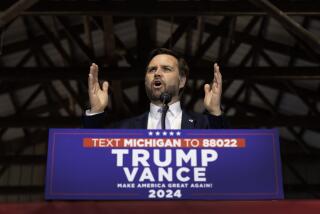Action at Center of Political Stage : Seven politicians seek to stir a true debate in ’96
- Share via
Colin Powell’s decision not to seek the presidency in 1996 removed one potential candidate from the race, but it left unaffected the hopeful expectation that prompted many Americans to consider him their choice.
To these voters, Powell was attractive for reasons that went well beyond the calm leadership he exhibited when, as chairman of the Joint Chiefs of Staff, he oversaw the U.S.-led coalition’s defeat of Iraq in the 1991 Persian Gulf War. Far more to the point, his character and his civil manner seemed to exemplify a redemptive alternative to the increasingly weaselly, nasty, self-serving tone that has come to define our national political culture.
A WAITING VOID: That so many Americans declared themselves ready to line up behind his candidacy, even though they knew little of what he thought about many of the largely irrelevant so-called issues that have come to clutter up presidential campaigns, defines a void in political aspirations that still waits to be filled.
Seven prominent politicians have been talking about that void and how to pump substance into it. Time magazine says this week that one of them might try to run as a third-party candidate for President. Former Sen. Paul E. Tsongas (D-Mass.), one of the seven, downplays that suggestion. He focuses instead on the prospect that he and his colleagues will be able to produce alternative ideas to what the major parties and candidates are likely to offer next year.
The other six are Sen. Bill Bradley of New Jersey; former Sen. Gary Hart and former Gov. Richard D. Lamm, both of Colorado; former Rep. Timothy J. Penny of Minnesota, all Democrats; and former Gov. Lowell P. Weicker Jr. of Connecticut and Maine Gov. Angus King, both independents.
EXCLUDED VOTERS: “There is,” says Tsongas, “a center in this country--whether you call it the passionate center, the radical center, the sensible center--that is basically socially inclusive, fiscally conservative, pro-environment, pro-campaign reform, and those people feel rather disenfranchised at this point.” They feel at least ethically excluded by what they see as pandering by the two major parties to the extremes of the political spectrum. And certainly many feel intellectually cheated by the cheap sloganeering that now substitutes for serious discussion of complex issues.
Can the time again come when the nation’s weightiest and most defining problems are truly debated in the context of a presidential campaign? The seven centrists who share with so many other Americans a disgust over the current state of political dialogue apparently intend to try to encourage such a debate. They can’t force the major candidates to talk substance. But by raising tough issues maybe they can compel the candidates to explain just why they prefer to keep their thoughts secret from those they say they are eager to serve.
More to Read
Get the L.A. Times Politics newsletter
Deeply reported insights into legislation, politics and policy from Sacramento, Washington and beyond. In your inbox three times per week.
You may occasionally receive promotional content from the Los Angeles Times.










